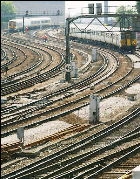German Firms Push for Early Start of Sudan Railway Project
By John Oyuke
Oct 14, 2004 (LiquidAfrica) — Sitting cosily under the moonlit skies, the German investors happily chat away the night, occasionally adjusting the pieces of wood to keep the fire in front of them burning.
 “Originally, our idea was to fly back home on the same day, but it has been very interesting. We decided to camp out here for the night to discuss the various possibilities before us in this project.
“Originally, our idea was to fly back home on the same day, but it has been very interesting. We decided to camp out here for the night to discuss the various possibilities before us in this project.
“When we flew back to Nairobi the following day, all of us were sure we wanted to embark on this project immediately,” a leading member of the delegation told The Financial Standard last week.
The top cream of the German business community had arrived in Nairobi from Kapoeta in Southern Sudan where they were entertained by the charm, songs and dance of the local communities.
When they were invited to speak at a church service the following day, the plan to build a multi-billion shillings railway line was sealed.
Mr Klaus Thormaehlen, a German railway magnate and the brain behind the proposed Sh320 billion-railway project linking Kenya to Southern Sudan, said the encounter left a lasting mark on the psyche of the investors and a determination to realise the dream of building the railway line.
To prove their determination and viability of the project, Thormaehlen has invested a total of Sh94 million (euro 1m) in feasibility studies.
The results of the study were the subject of a series of meetings that the team held with Government officials, including President Kibaki, last week.
Thormaehlen is leading a consortium of 15 German companies involved in railway construction. The goal is to establish a world-class rail transport infrastructure that will run through Kenya, Uganda and Southern Sudan.
At present, the consortium, which collectively boasts an annual turnover of Euro 22 billion, is also in pursuit of the concessioning contract for Kenya Railways Corporation (KRC) and Uganda Railways Corporation (URC).
It has already obtained authorisation of the Sudan People’s Liberation Movement/Army (SPLM/A) to construct the railway line linking Southern Sudan and the Port of Mombasa.
The German investor has a dream of seeing a trans-Africa railway line linking major towns in the Great Lakes region and the Indian and Atlantic Ocean coasts.
If successful, the project is expected to facilitate a seamless flow of goods and people across the national borders, opening up the region to investments.
“Without a rail road or proper infrastructure, there will be no development. My vision in this region is therefore to work with the people of Southern Sudan, Kenya and Uganda to realise their dream of economic development,” Thormaehlen said.
Unlike other foreign investors, Thormaehlen believes in sourcing raw materials as well as manpower for construction work locally.
For the railway project, he intends to source ballast for construction of concrete sleepers locally, a development that could create thousands of new jobs.
Besides, the entrepreneur plans to enter into a partnership with the Kenya Railways Training Institute (KRTI) to conduct training programmes for those who will work on the project.
“The idea is to equip local manpower with the necessary skills. Such a programme would also help integrate former SPLM fighters into society in Southern Sudan,” Thormaehlen said.
He said that the consortium planned to start working on the railway line from Kapoeta, with the establishment of a cement, concrete and sleeper factory. This, he says, should commence two months after the final peace agreement is signed.
A direct railway line is also expected to spur economic growth in Kenya?s semi arid north west, which currently relies on road transport.
According to the SPLM?s commissioner for International Cooperation, Dr Costello Garang, Kenya stands to benefit immensely once peace returns to Sudan.
“Kenyans would be better placed to fill the gap in southern Sudan?s manpower requirements, for both their industries and enterprises, given that generations of Southern Sudan have gone without education, creating a huge deficit in the skills needed for reconstruction,” he said.
In addition, a peaceful southern Sudan could translate into a huge market for Kenyan products, given Kenya?s industrial edge over its neighbours and the established commercial links between the two countries.
Analysts point out that Kenya has already received wide publicity among the Sudanese, particularly due to its role in the peace talks.
Naivasha and Machakos, the two towns that hosted the peace talks, are said to be two most popular Kenyan towns among the Sudanese.
Thormaehlen described the Kenyan rail system as archaic saying the world had shifted to the European standard gauge of about 1.434 metres that enables faster movement of goods and passengers.
“We are discussing with Kenya and Uganda on how to finance their sections of the project. Once this is done, we should be up and running,” he said.
Depending on how fast the two countries sign contracts with the consortium, building of the railway could start from Kenya or Uganda, while awaiting for peace to fully return to Southern Sudan.
Thormaehlen said building of the railway would be on a private/public sector basis, where Governments build the railway and the consortium provides the rolling stock, that is locomotives, rails and garages for repairs.
